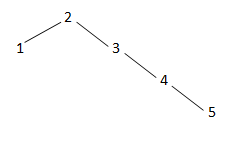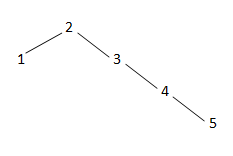Home »
C/C++ Data Structure Programs
C++ program to check whether a given Binary Search Tree is balanced or not?
In this tutorial, we will learn how to implement a C++ program that will check whether a given binary search tree is a balanced tree or not?
By Bhanu Pratap Raghav Last updated : August 10, 2023
Problem description
Solution to check the given Binary Search tree is balanced or not.
Problem statement
Write a C++ program that accepts input from user to form a binary search tree and check whether the formed tree is balanced or not.
Example 1
Input: 2 1 3 4 5 -1

Output: Given BST is Balanced : False
Example 2
Input: 2 1 3 4 -1

Output: Given BST is Balanced : True
What do you mean by height of a tree?
A height of a tree is the largest number of edges in a path from node to a leaf node. If a tree has only one node: i.e. root node itself then the height of tree is 0.
Example:

Height of tree: 2 ( maximum 2 edges from root to leaf)
Check when tree is balanced
A non-empty binary search tree is said to be balanced if:
- Its left subtree is balanced.
- Its Right subtree is balanced.
- The difference between heights of left and right subtree is less than or equal to 1.
Example:

At root height of left subtree is 1 , whereas height of right subtree is 3
Difference = 3-1=2 (which is greater than 1) i.e. Tree is not balanced.
Algorithm
- Set root=root of given binary search tree.
- Set leftHt= height of left subtree.
- Set rightHt= height of right subtree.
- if abs(leftHt – rightHt ) > 1
return false;
else isHeightBalanced(root->left) &&isHeightBalanced(root->right)
C++ program to check whether a given Binary Search Tree is balanced or not?
#include <iostream>
#include <cmath>
using namespace std;
class TreeNode {
public:
int data;
TreeNode* left;
TreeNode* right;
TreeNode(int d)
{
data = d;
left = NULL;
right = NULL;
}
};
TreeNode* insertInBST(TreeNode* root, int x)
{
if (root == NULL) {
TreeNode* tmp = new TreeNode(x);
return tmp;
}
if (x < root->data) {
root->left = insertInBST(root->left, x);
return root;
}
else {
root->right = insertInBST(root->right, x);
return root;
}
}
TreeNode* createBST()
{
TreeNode* root = NULL;
int x;
cin >> x;
//Take input until user inputs -1
while (true) {
if (x == -1)
break;
root = insertInBST(root, x);
cin >> x;
}
return root;
}
//Calculate height of tree with given root
int height(TreeNode* root)
{
if (root == NULL)
return 0;
int leftHt = height(root->left);
int rightHt = height(root->right);
int curHt = max(leftHt, rightHt) + 1;
return curHt;
}
//Check whether tree is balanced or not
bool isHeightBalanced(TreeNode* root)
{
if (!root) {
return true;
}
int leftHt = height(root->left);
int rightHt = height(root->right);
if (abs(leftHt - rightHt) > 1)
return false;
return isHeightBalanced(root->left) && isHeightBalanced(root->right);
}
int main()
{
//Input BST
cout << "Input Tree elements : ";
TreeNode* root = createBST();
cout << "Given BST is Balanced : ";
if (isHeightBalanced(root)) {
cout << "True";
}
else {
cout << "False";
}
return 0;
}
Output
First run:
Input Tree elements(stop taking input when -1 encountered) : 2 1 3 4 5 -1
Given BST is Balanced : False
Second run:
Input Tree elements(stop taking input when -1 encountered) : 2 1 3 4 -1
Given BST is Balanced : True
Advertisement
Advertisement